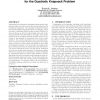Free Online Productivity Tools
i2Speak
i2Symbol
i2OCR
iTex2Img
iWeb2Print
iWeb2Shot
i2Type
iPdf2Split
iPdf2Merge
i2Bopomofo
i2Arabic
i2Style
i2Image
i2PDF
iLatex2Rtf
Sci2ools
GECCO
2005
Springer
2005
Springer
Greedy, genetic, and greedy genetic algorithms for the quadratic knapsack problem
Augmenting an evolutionary algorithm with knowledge of its target problem can yield a more effective algorithm, as this presentation illustrates. The Quadratic Knapsack Problem extends the familiar Knapsack Problem by assigning values not only to individual objects but also to pairs of objects. In these problems, an object’s value density is the sum of the values associated with it divided by its weight. Two greedy heuristics for the quadratic problem examine objects for inclusion in the knapsack in descending order of their value densities. Two genetic algorithms encode candidate selections of objects as binary strings and generate only strings whose selections of objects have total weight no more than the knapsack’s capacity. One GA is naive; its operators apply no information about the values associated with objects. The second extends the naive GA with greedy techniques from the non-evolutionary heuristics. Its operators examine objects for inclusion in the knapsack in orders...
| Added | 27 Jun 2010 |
| Updated | 27 Jun 2010 |
| Type | Conference |
| Year | 2005 |
| Where | GECCO |
| Authors | Bryant A. Julstrom |
Comments (0)

